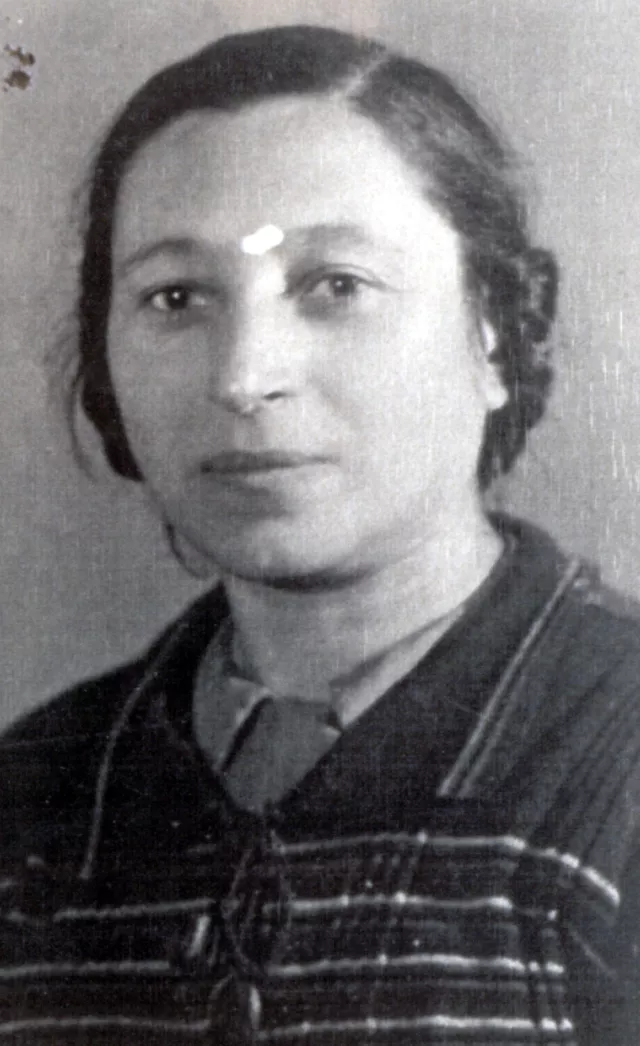Irina Doroshkova’s mother Hava Ozer
My mother Hava (Eva) Ozer photographed in Berdichev in 1945. In that time she worked as a teacher of history and lecturer-propagandist.
My mother also came from a Jewish family in Berdichev. Her parents died of enteric fever in 1914 when my mother was 6 [she was born in 1908]. There were no relatives willing to adopt five children and they were all sent to a children's home. Children in the Jewish children's home were raised Jewish. They studied Yiddish and Jewish traditions. Girls studied housekeeping. The community tried to give children some professional education [crafts] and provided girls with a dowry for them to marry successfully. regretfully, my mother told me little about this period of her life. The children lived likea commune in this home. They had no personal belongings. In the Soviet society all people including children were to behave and think alike. To be different was a bad-mannered and wasn't appreciated in any Soviet institution including children's homes. In the Jewish children's home the situation was more loyal than elsewhere, but still, it developed severity and independence in my mother. She didn't like talking or thinking about the past. She believed one had to think about the future rather than look into the past. My mother and her fellow comrades were raised atheists and internationalists and forgot about their Jewish identity. They believed that it was narrow-minded to focus n one's identity when the soviet power gave people freedom, equality and happiness to all nations.
My mother was the core of the family. She was a very wise woman and people always came to ask her advice: she helped them to live in peace with their relatives, told them where it was better to send their children to get education and how to spend money wisely. She was a wise and smart woman. She willingly shared her ideas and experiences with other women helping them with routinely matters such as cooking, looking after children or house. Whatever one's convictions were there were neighborly relationships that my mother cherished, always trying to help and support other people regardless of their nationality. My mother was a young girl during the October revolution and Civil war but communist ideas became her religion. My mother believed in the Communist Party as if it were God and believed that socialist life was the best. She got free education and a place to live. The Soviet propaganda was so strong that people strongly believed that everything good they had inn life was given to them by the caring Soviet state. When she was very young she became a typesetter at a printing house. She knew Russian and Yiddish and set texts in these languages. She studied simultaneously - she studied continuously. My mother was happy to be an independent woman and not to have to marry for convenience. She became a Komsomol activist and later - an activist in the guild of printers before she turned 16. She was sent to take a training course at the All-Union Council of Trade Unions in Moscow. After finishing this training my mother became director of the municipal library in Berdichev and a lecturer-propagandist. She lectured at various enterprises explaining advantages of the socialism and communism to workers. My mother joined the Communist Party in 1929 when she had just turned 20.
She went to various organizations in town to explain the policy of the Party and the Soviet government. Somewhere at the crossroads of her activities my mother met my father who was a student of the Pedagogical Institute. He fell in love with her. In their relationships my mother always played the leading role - my father did what she wanted. My father was devoted to my mother and did what she told him. My father wasn't a member of the Communist Party. Firstly, he wasn't as active as my mother, and secondly he was a son of a slaughterer - servant to religion and such people were not admitted to the Party, but my father wasn't really willing.
When they decided to get married at the beginning of 1930 any talks about religious wedding were out of the question. There wasn't even a wedding party. My parents got married at the town registration office.
In evcuation my mother was a propagandist too. The collective farm was located in several villages and my mother went there to tell villagers about the situation at the front and about the policy of the Soviet Union. She read a lot and was aware of all events at the front. We didn't starve - our parents took every effort to provide sufficient food for us.
Berdichev was liberated in the late fall of 1944 and we returned home in March-April 1945. Our house wasn't ruined and we returned to our apartment - only our belongings were gone. After the war my mother taught history at school and continued her lecturing activities. On certain days she lectured at some organizations telling them about international situation and the state policy. I don't know whether she was paid for this, but I believe she was. My mother did understand more than she mentioned.











